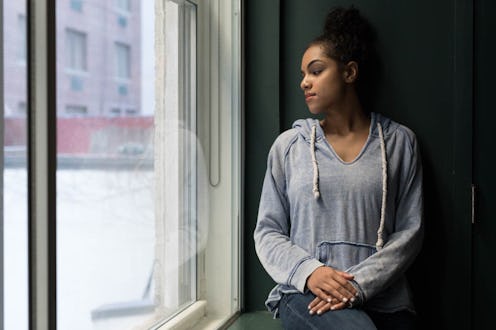
You're not imagining it: Depression diagnoses are on the rise — and although that sounds alarming, it's not clear what's causing the spike. The updated statistics were released by the Blue Cross Blue Shield Association (BCBSA) Thursday in a report called Major Depression: The Impact on Overall Health. According to the health care company, diagnosis rates for people with insurance rose by 47 percent for millennials and 63 percent for adolescents from 2013 through 2016. Overall, depression diagnoses have risen 33 percent since 2013, and that number could be greater when counting in people who do not have insurance. Previous studies have suggested that depression is increasing, so these findings are in line with existing research.
In a press release about the findings, psychiatrist Dr. Karyn Horowitz says the increase in adolescents could be related to a "combination of increased electronics use and sleep disruptions in already vulnerable individuals." According to Pew Research, only 8 percent of millennials don't have smartphones. "Increased use of electronics, video games more commonly in boys and social media/texting more commonly in girls, can lead to increased conflict both within the home and with peers," Horowitz says in the release.
While it's sobering to think about depression diagnoses being on the rise, it's possible that this is actually a helpful development. An increase in diagnoses doesn't necessarily mean an increase in conditions — it could be that people are more willing to talk to health care providers about their mental illness and seek treatment. I have major depressive disorder, but I was undiagnosed for several years because I didn't want to tell anyone what was going on. It's hard to know whether the increase in depression diagnoses is because depression is on the rise, or people are simply being more open about it.
BCBSA points out that there are increased health risks associated with depression, and 85 percent of people diagnosed with depression have another chronic health condition. Because of the way that depression can affect your mood, productivity, appetite and general wellbeing, it isn't surprising that it can affect your health in other ways, too. Trent Haywood, M.D., J.D., senior vice president and chief medical officer for BCBSA, says major depression diagnoses in young people could have "a substantial health impact for decades to come."
"Further education and research is needed to identify methods for both physicians and patients to effectively treat major depression and begin a path to recovery and better overall health," he says in the press release. "In preliminary literature, high users of social media have been linked with higher rates of social isolation than low users."
I can understand why this is a concern for health care and insurance providers — people with depression use health care services more than people who don't have mental illnesses, which means that patients and providers are spending more money. Depression is more likely to cause someone to seek outpatient treatment like therapy, prescription coverage, and inpatient hospitalization, according to the research. But if people with depression are seeking treatment, that's a win for those who want to reduce mental health stigma.
There are steps we can take to reduce our risk of depressive episodes, like exercising often, getting enough sleep, and talking to the people around us about what we're feeling, in addition to maintaining a treatment plan designed by your health care team. A depression diagnosis isn't the end of the world, and it's often the first step to getting the treatment you've needed for a long time. More research is needed to figure out whether depression is increasing and what could be causing it, but in the meantime, people who are depressed are asking professionals for help. Mental health stigma stops people from seeking treatment, and I've lived it firsthand. One of my biggest regrets is not telling my doctor about my depressive symptoms sooner, but hopefully, other people aren't forced to wait.